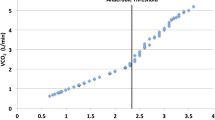Abstract
Exercise testing among the pediatric congenital heart disease population continues to transform and expand the way patients are evaluated and managed. We describe a case where a stress echocardiogram was performed while successfully collecting data from a previously implanted CardioMEMS™ HF system which helped guide decision-making.

Similar content being viewed by others
References
Paridon SM et al (2006) Clinical stress testing in the pediatric age group: a statement from the American Heart Association Council on Cardiovascular Disease in the Young, Committee on Atherosclerosis, Hypertension, and Obesity in Youth. Circulation 113(15):1905–1920
Rowland TW, ACOS Medicine (2017) Cardiopulmonary exercise testing in children and adolescents. Human Kinetics, Champaign
Rhodes J, Alexander ME, Opotowsky AR (2019) Exercise physiology for the pediatric and congenital cardiologist. Springer, New York
Gibbons RJ et al (1997) ACC/AHA guidelines for exercise testing: a report of the American College of Cardiology/American Heart Association task force on practice guidelines (committee on exercise testing). J Am Coll Cardiol 30(1):260–311
Abraham J et al (2019) Association of ambulatory hemodynamic monitoring of heart failure with clinical outcomes in a concurrent matched cohort analysis. JAMA Cardiol 4(6):556–563
Abraham WT et al (2016) Sustained efficacy of pulmonary artery pressure to guide adjustment of chronic heart failure therapy: complete follow-up results from the CHAMPION randomised trial. Lancet 387(10017):453–461
Giardini A et al (2011) Physiologic decrease of ventilatory response to exercise in the second decade of life in healthy children. Am Heart J 161(6):1214–1219
Sietsema KE et al (2020) Wasserman & Whipp’s: principles of exercise testing and interpretation: including pathophysiology and clinical applications. Lippincott Williams & Wilkins, Philadelphia
Mantegazza V, Apostolo A, Hager A (2017) Cardiopulmonary exercise testing in adult congenital heart disease. Ann Am Thorac Soc 14(Supplement 1):S93–S101
Arena R et al (2010) Cardiopulmonary exercise testing in patients with pulmonary arterial hypertension: an evidence-based review. J Heart Lung Transplant 29(2):159–173
Avari Silva JN et al (2020) First-in-human use of a mixed reality display during cardiac ablation procedures. Clin Electrophysiol 6(8):1023–1025
Silva, JNA, et al (2020) Development and human factors considerations for extended reality applications in medicine: the enhanced electrophysiology visualization and interaction system (ĒLVIS). In: International conference on human-computer interaction. Springer
Roelle L et al (2020) The impact of direct to consumer wearables in pediatric electrophysiology telehealth clinics: a real-world case series. Cardiovasc Dig Health J 1:169
Funding
No external funding. The authors have indicated they have no financial relationships relevant to this article to disclose.
Author information
Authors and Affiliations
Corresponding author
Ethics declarations
Conflict of interest
The authors have indicated they have no relevant conflicts of interest to disclose.
Ethical Approval
Institutional IRB approval is not required single case reports.
Informed Consent
Consent was obtained by the study participant’s parents.
Additional information
Publisher's Note
Springer Nature remains neutral with regard to jurisdictional claims in published maps and institutional affiliations.
Rights and permissions
About this article
Cite this article
Orr, W.B., Colombo, J.N., Roberts, B. et al. Incorporation of the CardioMEMS™ System During an Exercise Physiology Test in a Pediatric Congenital Heart Disease Patient Contributing to Medical Decision-Making. Pediatr Cardiol 43, 695–699 (2022). https://doi.org/10.1007/s00246-021-02758-z
Received:
Accepted:
Published:
Issue Date:
DOI: https://doi.org/10.1007/s00246-021-02758-z




